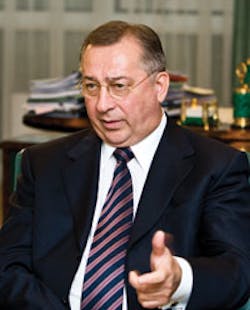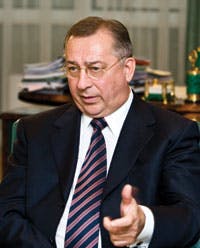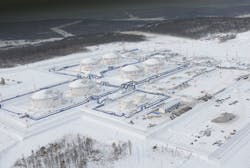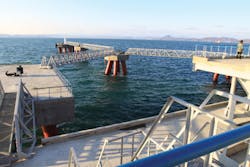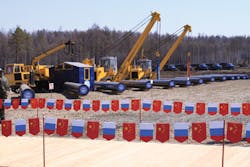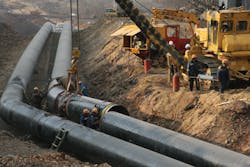Transneft is busy building pipelines and improving its financial position
EDITOR'S NOTE: Nikolay Tokarev has been president of Transneft since October 2007. His company is helping to usher Russia into a new era of oil export and delivery. During this interview, Tokarev spoke candidly about Transneft's role in Russia's energy plans, the importance of new pipelines to the East, problems the company is currently facing in trying to diversify supply routes to Europe, and the levels of capital expenditure currently being undertaken in order to achieve the Kremlin's strategic energy plans. The interview was conducted by the editors of Focus Reports LLC exclusively for Oil & Gas Financial Journal.
OIL & GAS FINANCIAL JOURNAL: Following the breakup of the Soviet Union, one of the major challenges for Russia's energy transporters, including Transneft, was to reach its customers in the European Union while maintaining a balance with the newly formed countries crossed by the transit system. How difficult is it to find a balance between negotiation and simply finding alternative routes to bypass problematic states?
NIKOLAY TOKAREV: During Soviet times, when the oil transport infrastructure was created, oil was supplied to Eastern Europe through the Druzhba pipeline and through the Novorossiysk seaport. Oil refineries in Eastern Europe were technologically oriented towards processing oil with the physical and chemical characteristics of oil exported from the Soviet Union only. That is why Transneft did not have to look for new markets after the collapse of the Soviet Union. We inherited the Eastern European markets. Obviously, Transneft could not limit itself exclusively to the export destinations inherited from the Soviet Union, and eight years ago the company constructed a new pipeline to the Baltic countries. Now, diversified exports give Transneft a presence in the same traditional markets with larger volumes of oil.
About Transneft Transneft is a state-operated Russian company responsible for the building, operation, and maintenance of nearly 31,000 miles of pipeline, which account for the transport of 93% of Russian oil production each year. As such, the company is charged with putting into effect the Kremlin's energy strategy and maintaining access and supply from Russia's major oil fields. It also has responsibility for the pipelines that link the country to its export partners. In the western portion of Russia, Transneft keeps the oil flowing to Europe along several different routes. In the East, Transneft is building a new pipeline that will connect Russian oil production to Chinese markets for the first time in history — the East Siberian-Pacific Ocean (ESPO) pipeline. The Chinese government loaned Transneft US$10 billion to complete this project, which will have a capacity of 50 million tonnes of crude (366.5 million barrels) when finished. This project has the potential to change the global oil landscape — Russia gains a huge new export destination, lessening its reliance on Europe, and China receives a new source of oil to feed its mushrooming industrial development. |
As for the transit countries, we have had some issues, but Russia has individual agreements with every one. These agreements regulate both the commercial and legal aspects of the relations with these countries. Very recently, Russia signed an agreement with Belarus, which will help to solve all the problems that we had before.
OGFJ: Last September, Prime Minister Vladimir Putin stated that Turkey will become Russia's new energy corridor, bringing Russia's energy to the world. How important for Transneft are the agreements reached with Turkey over the Samsun-Ceyhan pipeline?
TOKAREV: This is a new stage of our activities. Today, the maximum oil transfer capacity of the Turkish Straits is 110 million tons. Turkey has imposed considerable transit restrictions on the tankers that pass through the Turkish Straits in terms of speed, the type of tanker, and the time of the day that transit is allowed. 110 million tons is the maximum possible transfer capacity in the Turkish Straits. On top of this, another 45 million tons of oil products are transported through the Straits. After the Caspian pipeline is extended to accommodate Kazakh oil, the aggregate amount that appears in the basin of the Black Sea will be locked in by these transit restrictions. As a result, we will need new options for transporting oil from the Black Sea through the Mediterranean to Europe. As the oil we're talking about is mainly Russian and Kazakh, Transneft is, of course, interested in acquiring new export directions. This is where the idea of participating in the Samsun-Ceyhan pipeline originated. This is actually an old idea, but could not originally get the green light due to a lack of oil resources. However, the prospect of the next four years brought this issue back to the table.
The Samsun-Ceyhan pipeline project envisages the participation of Kazakh partners. Turkey recently hosted a meeting of work groups with representatives from Russia, Eni (Italy), Calik (Turkey), and KazMunaiGaz (Kazakhstan's national gas company), which will soon be involved in the project. These groups will develop the commercial, technological, and logistic sides of this project. This is a promising project, but it requires more analysis and development to fully understand its economic feasibility. If the final result is unanimously approved as positive, we can expect its implementation this year.
However, I would like to stress the following point. I'm sure you have heard that Transneft and Russia started another project, the Burgas-Alexandropoulos pipeline, with Greece and Bulgaria three years ago. There is an interstate agreement in place among Greece, Bulgaria, and Russia. An economic feasibility study is being prepared with involvement from technical, legal, and financial consultants. Russia came up with the idea of joining the operations of Burgas-Alexandropoulos with Samsun-Ceyhan, and using each pipeline to transport a different type of oil. An international holding consisting of all the owners and producers of oil is to be in charge of the two projects. We have discussed this with Chevron, Eni, Calik, as well as Greek and Bulgarian companies, and everyone is interested.
However, the new Bulgarian government's attitude to this project is not as clear as it used to be. Unfortunately, at this moment the project is not a priority for Bulgaria, and Transneft is trying to pursue a certain policy in order to promote it, as it is being financed and the Bulgarian government needs to make up its mind and announce its position officially. In public, Bulgaria does not support the project, and the Bulgarian government expresses its concerns over its environmental footprint and its commercial implications. At the same time, unofficially, the Bulgarian government believes that the project is excellent.
What Transneft wants is an official acknowledgement from Bulgaria. This is a great project: it will reduce the load in the Bosphorus, leave them available for lighter and less hazardous cargo and develop a new and commercially adequate export direction.
OGFJ: Why is it a good project for the Bulgarians?
TOKAREV: First, Bulgaria will collect a tax for oil transit. According to rough estimates, it will amount to about $50 million USD. In any case, this project does not make Bulgaria accountable for anything. We're talking about a very short distance and no environmental risks at all, which is guaranteed by the safest modern construction technologies. Besides, it makes Bulgaria self-sufficient in terms of oil supplies: a new oil terminal will be constructed at Burgas to receive oil from the sea.
OGFJ: Looking towards the East, during the opening of the ESPO-1 pipeline in December 2009, Prime Minister Putin said that this milestone was "a great New Year gift to Russia." What are your personal views on such an ambitious project for modern Russia and the impact on the country's economy?
TOKAREV: My personal opinion is the same as that of the head of a national oil transport company. I believe this project is economically and, most importantly, geopolitically grandiose. The economic aspect is evident: a new export route for Russia. All the limits that Russia used to have for oil export have been removed. The ESPO pipeline will grow very quickly. We're constructing the second stage and have already welded the first 3 km out of 2,000 km. The ESPO's capacity will reach 50 million tons of oil by 2014.
OGFJ: How will this impact the oil industry as a whole?
TOKAREV: I meant it when I said "grandiose." This word is the best way to describe the situation. Apart from giving Russia a new export route and the opportunity to maneuver oil resources to the West and to Asia, this pipeline will also stimulate the general development of the region. We're already witnessing the booming development of the regions adjacent to the pipeline: construction of roads, electricity transmission lines, new settlements, and, most importantly, development of new oil fields. A list of East Siberian oilfields that will enjoy our services under privileged conditions has been approved today. It already includes 22 fields.
OGFJ: Will foreign companies enjoy privileged conditions such as tax breaks as well?
TOKAREV: We're talking about companies that produce and export oil through the ESPO pipeline. The first company to be exempt from export tax and production tax is TNK-BP, which as you know is 50% English and 50% Russian owned. This means that from now on these 22 fields will face intensive development to fill the ESPO pipeline. Besides, this project also stimulates employment, as about 3,000 people are involved in the operation of the first stage of the pipeline. Granted, the local budgets get tax revenues. Right after our meeting here, I'll receive Vyacheslav Shtyrov, president of Sakha Republic (Yakutia), to discuss the prospects of tax collection for the Yakutian budget from the ESPO pipeline.
OGFJ: 2010 will see Transneft for the first time not only transporting oil but selling it directly to China as a result of the agreements reached over the ESPO pipeline. What does this mean for the future of Transneft?
TOKAREV: If we regard Transneft as an oil supplier to China, this does not mean anything for our development. As a matter of fact, this situation is an exception from the law. Transneft is a state monopoly that is exclusively in charge of transporting oil. This arrangement ensures equal access to the pipes for all oil companies. If we were a producing company, we would pursue our own interests in the first place. Selling oil to China is a technical decision as it allowed a quick solution for crediting and oil supplies. In this case, Transneft does not produce its oil but buys it from Rosneft where it is further bought and sold under minimal profitability. That explains why Transneft has no prospects at all in China as a seller.
OGFJ: Many argue that Transneft operates free from the worries of competition. It is easy to see why people think so. Transneft transports around 93% of oil produced in Russia, with a cost-plus tariff in place. Under such a comfortable scenario, how do you aim towards efficiency within the company you manage?
TOKAREV: Transneft constructs a lot of new sites such as the second stage of the Baltic Pipeline System (BTS) — thousands of kilometers of pipes with new oil terminals. Financially, this amounts to around $4 billion USD. We're going through the second stage of ESPO pipeline construction (2,000 km) and expanding the first stage to a capacity of 50 million tons. This project will cost about $10 billion USD. In February 2010, we started construction of a new Purpe-Samotlor pipeline (about 500 km), which will cost $1.5 billion USD. These projects are not financed through the state budget at all. Transneft either earns these funds or attracts them externally through Eurobonds, long-term revenue-yielding bonds, Sberbank's credit, or Chinese credit. We received the latter for 20 years under very favorable terms.
Transneft needs to earn money and implement projects to service the loans, and is also in charge of its internal tasks such as operation of the 50,000 km of existing pipes. Obviously, it requires efficient, thorough and economically effective work, so we need to concentrate our resources. In this respect, Transneft greatly regrets the indifference of the Ministry of Finance of Russia. This is also an answer to your question: if the company manages on its own, there is no need to think of ways to help it. This is the reverse part of our work. On the other hand, the results are really good. Recently, Standard & Poor's placed Transneft above the sovereign credit rating, and we share this position with only two or three other companies in Russia.
OGFJ: But you pay small dividends. Is this going to continue?
TOKAREV: I wouldn't say that dividends of 10% of the net profit of our head company are that small. We also have a few dozen subsidiaries that accumulate profit, but the only company that pays dividends is the head Moscow platform.
As you understand, 2008 and 2009 were financially difficult, and a lot of enterprises were firing their employees, reducing the working hours, or were making no payments at all. Transneft did not fire a single employee because of the financial crisis. On the contrary, we were hiring new employees and increased the salaries for all our employees.
OGFJ: Do you have a final message to Oil & Gas Financial Journal's readers in oil capitals across the world about Transneft?
TOKAREV: I would like to wish all my colleagues from the oil and gas production business to overcome the economic crisis and have a good recovery. I would also wish them all stable oil prices and good luck in exploring new major fields!
More Oil & Gas Financial Journal Current Issue Articles
More Oil & Gas Financial Journal Archives Issue Articles
View Oil and Gas Articles on PennEnergy.com
